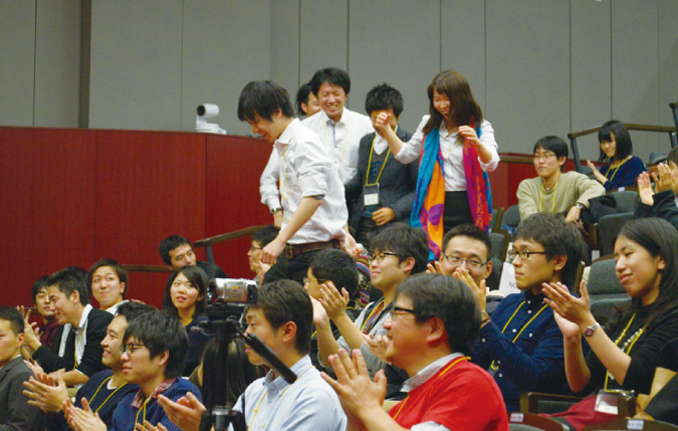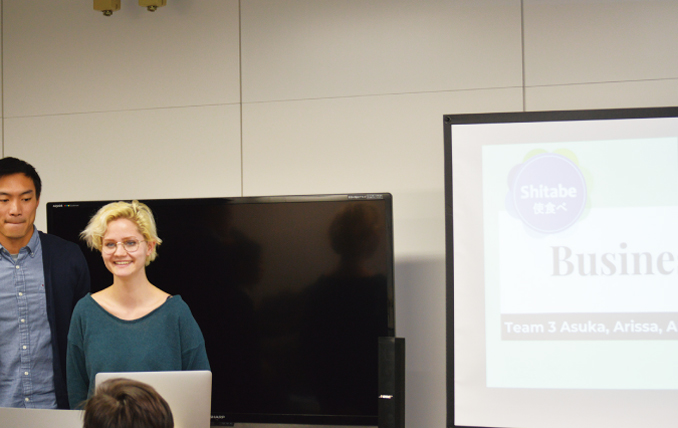Nominated to teach yet don’t know how
The Appropriate Technology course that I taught began as a course based on an idea for another project that Prof. Ohneda and I came up with before the HBP started. Then, Prof. Nagata, the current president of the university, advised us to incorporate ideas from MIT’s D-Lab and the Stanford d. school into the educational plan; we created the program outline based on that advice, but unfortunately, our project was not selected. Subsequently, however, we agreed to introduce the Appropriate Technology course to the HBP. The university had applied to the Ministry of Education, Culture, Sports, Science and Technology, explaining that, in the Appropriate Technology and Entrepreneurship courses, the HBP would cultivate future professionals through the power of “breakthroughs” and “accomplishment,” which, aside from research activity, is considered to be competency building. Although I was nominated to teach the Appropriate Technology course, I did not actually know how to design a course in a field in which I was not specialized. Nevertheless, I searched for “Appropriate Technology” on Google and found the See-D Contest, which aims to solve the problems of developing countries by making the best use of appropriate technologies. When I contacted Mr. Endo, the organizer of the contest, he suggested that my class participate in the See-D Contest. I decided to learn alongside my students as a participant in the first offering of Appropriate Technology. I felt as if I was figuring everything out while participating. Even now, I feel that I am providing the students who take the course with a place to learn, rather than teaching them directly. For the first three years following the implementation of the HBP, participation in the See-D Contest informed my design of the course; however, as of the fourth year, I was fully in charge of teaching the subject.
I would like to point out a future challenge regarding the management of the program. Given that, in addition to the Appropriate Technology course, the HBP provides many other opportunities aside from research activities, numerous faculty members are involved. Therefore, when the HBP receives feedback from inside and outside of the university, sharing the information with faculty members is a challenge that should be addressed.

See-D Contest as the initial stage of "Appropriate Technology"
[ Appropriate Technology ]
It was necessary to design a new problem-solving program not existing in the common framework in order to realize the educational program to train the skills necessary for solving the global-scale problems listed in the global oversea training.
In “Appropriate Technology”, students are required to consider the local needs, cultures, environments and people in developing countries and developed areas with severe issues, and to find and solve social issues by developing the appropriate technologies. Students can acquire the problem-solving skills, field responsiveness and entrepreneurial skills.
Experience failure and hardship
I originally worked at Hitachi, Ltd., where I was engaged in R&D on behalf of universities and pharmaceutical manufacturers. I provided my clients with interpretation of the data obtained through Hitachi’s comprehensive analysis technology on genes and proteins using Hitachi’s IT technology. I worked in a very unique business unit, which created intellectual property and interpreted data, rather than tangible products. Unfortunately, the business failed after eight years because I could not make it profitable. I always share this failure story with students when I introduce myself at the beginning of the course.
I was invited by the program leader of the HBP at the time to help students to become “competent professionals.” The HBP aims to foster competent leaders, rather than knowledgeable experts, as it is a program that fosters future professionals who can interpret their knowledge and share it with society, and not one that tries to cram knowledge into students. Therefore, the Entrepreneurship course that I teach is an essential subject for students in the program; it is not about sharing arrogant success stories such as “I started a business and succeeded in this way.” I offer students realistic and practical course contents that involve guest lectures by people who have experienced failure and hardship, like me, including entrepreneurs who are struggling with their business or those who closed their company themselves in the past.

Challenge for reforms of entrance examination
[ Entrepreneurship ]
In order to realize the "training and fostering of the power of accomplishment backed by technical abilities" listed by HBP as a development goal, it was necessary to provide an environment in which the acquired knowledge can be actually utilized through projects, and teachers with abundant experiences were also needed for this educational subject.
HBP provides a class of "Entrepreneurship" for connecting the outcome of studies to a business and learning basic knowledge and skills to start business by utilizing professional outside resources. The class aims to learn the practical forms of thinking in order to overcome the unknown environment and situations difficult to predict as a leader.

